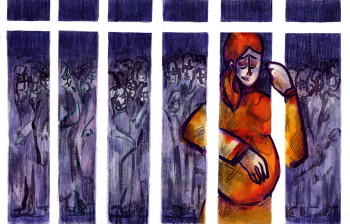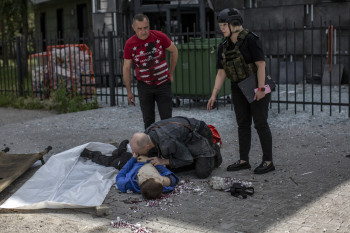‘They were real beasts’: A farming couple describes what occupation looked like in their village

NOVYI BURLUK, Kharkiv Oblast – The darkness setting over the muddy street of the small hamlet in Kharkiv Oblast did little to hide the destruction Russian soldiers left behind.
Novyi Burluk, located 85 kilometers south of the Russian border, was occupied on the first day of the full-scale invasion. The occupation lasted for seven months.
When it was over, the village was a shadow of its former self.
Amid burned carcasses and ransacked schools, bullet holes pockmarked the fences of homes, in which locals had used white chalk to write in large capital letters, "PEOPLE LIVE HERE."
Ukraine's army liberated Novyi Burluk, 75 kilometers from Kharkiv, on Sept. 10, during its swift fall counteroffensive in eastern Ukraine.
Standing outside his bullet-ridden house in mid-October, Anatolii Brezhnyk still sobbed when recalling what Russian soldiers did to his native village.
"They shot a girl here, she was 10 years old," he said, tears running down his face. "She was driving with her grandfather, and they shot her."
The girl, Katya Vinarska, had been wounded in Russian shelling on the second day of the country's full-scale invasion and was shot as her grandparents drove her from Noviy Burluk to a hospital in neighboring Chuhuiv.
"I'm 61 years old, I've never seen anything like this," Brezhnyk told the Kyiv Independent.
"God grant that Russia disintegrates into pieces so that they feel what war is like — fuck Russia, fuck Russian bread, fuck Putin," he added.
The day it started
The fog of Feb. 24 was so dense that local residents didn't see Russian soldiers arrive, Brezhnyk's wife, Liudmyla, a farm manager, told the Kyiv Independent.
It was only the next day that locals understood Russia's full-scale invasion had arrived at their doorsteps.
"On Feb. 25, they came into the streets, and we all came out and asked: "Why did you come here?" And they told us that they came to have military exercises," she said.
Russian troops seemed lost at first. Valentyn, Brezhnyk's neighbor, told the Kyiv Independent.
"A convoy came, they got lost, they had to go straight, but they didn't have any maps, nothing," he said.

Anatolii first tried to reason with them, his wife said.
"We have roses here, and the neighbor has a garage. And when they turned around with a tank and hit his garage, my husband said: 'Guys, don't walk on the roses'."
"Don't be afraid, old man, we won't," she recalled them answering.
Anatolii and Liudmyla Brezhnyk, though they did not know it at the time, were meeting soldiers from Russia's 3rd Vislenskaya Red Banner Motorized Rifle Division, a motley regiment composed of at least four units from all across Russia, according to the findings of Ukrainian open-source intelligence (OSINT) research group Molfar.
The neighbor's roses would become the least of the couple's worries over the coming months.
Shooting civilians
The wanton killings quickly escalated as Russians took over the village, starting with the murder of Katya Vinarska, the little girl, the Brezhnyks recalled.
On Feb. 24, Katya's grandfather Mykola Kivshar, a neighbor of the Brezhnyk family working in Kharkiv, offered to take the child from Northern Saltivka, a Kharkiv district that was being heavily shelled, to Novyi Burluk, where the situation seemed quieter.
That was until Russia began shelling that village too, the next day, on Feb. 25.
In a bid to escape yet again, Katya's grandfather decided to bring her back to Kharkiv.
It was too late. His car came under Russian fire.
According to her grandmother's account in Suspilne Kharkiv, a local public media outlet,
the 10-year-old was shot in the stomach and then, on the way to the hospital, shot again in the head.
It is unclear if the car had been targeted or hit by a stray bullet.
Russians also shot a 40-year-old local resident on Feb. 26, this time at point blank, local police reported after the oblast's liberation.
According to the report, Russian soldiers got upset when he began filming how they looted the local store.
"They shot a guy for nothing," Anatolii recalled painfully.
"He was just standing on the threshold (of his house), they shot him in the left eye," Anatolii remembered witnessing.
"When they started to shoot, I phoned my son in Chuhuiv and said: That's it, trouble has come," Liudmyla recalled.
Liudmyla gave a choice to her 24 employees at the farm nearby that she manages.
"Let's decide, I'll leave for 10 minutes," she recalled telling them. "And all of you who want to stay need to go to the right, those who don't want to, go to the left, we'll give you a salary, and you'll leave."
"I returned after 15 minutes. Everyone was standing on the right."
Only three employees left the farm, she said.
"Everyone else stayed and worked," despite the hardship and the constant looting.
'True horror'
As the months wore on, life under occupation became unpredictable but always brutal. One group of soldiers was especially violent, according to the Brezhnyks.
"The Buryats were real beasts," Liudmyla said, shaking her head in disbelief. "When the Buryats came, they took our boys, killed them for every tattoo on their bodies, stripped them naked, and beat them."
Buryats are an ethnic group of Mongolian origin, many of whom live in Buryatia, an Eastern Siberian Russian republic.
Buryatia is one of Russia's poorest regions, and a soldier's salary is way above the average in the region, which explains the numerous testimonies about their presence in Russia's ranks.
In conversations with the Kyiv Independent back in June 2022, Ukrainians in several regions mentioned that significant parts of Russian forces were ethnic Buryats, with a sprinkling of other Siberians.
Russian soldiers of Buryat and Chechen origin have often been associated with violence against civilians, partly because reports of war crimes in Bucha in spring often singled out these groups as perpetrators.
They aren't the only groups to be violent towards civilians – this type of violence has been characteristic of the Russian army throughout the invasion.
During the occupation of Novyi Burluk, Russian soldiers beat and tortured those Ukrainian veterans who had stayed in the village, Anatolii said.
"If they found a military uniform, they were tortured and beaten," he said.
The 500-people village quickly depleted when it became clear that Russian soldiers' trail of destruction would not stop at veterans, with troops threatening anyone crossing their way.
Some locals were taken from their cars and arbitrarily beaten up, said Valentyn, Brezhnyk's neighbor.
"This was true horror."
read also

Valentyn himself stayed in the village for 98 days until Russian soldiers shoved him to a wall and almost shot him "for no reason."
It was too much to bear for him. He decided to leave through an evacuation corridor on May 30.
Molfar's research showed that in May 2022, units of Russia's 6th Army of the Western Military District, Eastern and Central Military Districts, and the 11th Corps of the Baltic Fleet were garrisoned in the area.
After their neighbor's departure, only the Brezhnyks were left, subjected to four long months of constant harassment by the occupiers.
"My husband and I, we were the only ones who stayed here, alone from the 25 houses, because I couldn't leave, because I have a country, my farm, my flag," Liudmyla said proudly.
"I stayed myself, like a (lonely) wolf, I had no one to chat with," her husband replied bitterly.
The Brezhnyk's grandchildren had evacuated to Poland while their sons fled to Chuhuiv, a Kharkiv Oblast city that briefly fell to Russia before being liberated on March 7.
"When the Buryats left, people from the DPR arrived," roughly two months after the first units' arrivals, Liudmyla said, referring to the Kremlin-backed proxies in occupied Donetsk.
At first, the family felt relieved, thinking the new troops would be less violent.
Russians constantly used humiliation and fear to extort goods from locals, according to Anatolii.
"They came to my yard with a machine gun, saw a car outside, and said: 'Give me the car or spare parts.'"
"And what can you do? I have nothing in life, and they have guns," she recalled. "They told me: 'You are slaves, collective farmers.' You have to obey, give everything they ask for, and potatoes too."
"He took the potatoes, and then he kicked me with a gun on the back: 'Give me only the good ones.'"
"This is some kind of humiliation. They shot the dogs, why the dogs?" Anatolii added.
Stealing everything
The whole occupation was a long nightmare of constant looting and destruction. Russians took away everything, from phones to pillows, and destroyed what they couldn't take.
Chechens, Buryats, Kremlin proxies from Donetsk and Luhansk, all kinds of units came to the hamlet, ransacking it over and over again, Brezhnyk said.
"They were looking for money, they were looking for everything they could," Liudmyla said. "They even took women's underwear."
"They looked around, rummaging through with guns. At our neighbor's house, they've taken clothes and mattresses from the beds."
One group of soldiers destroyed the village's school, stole computers, burned books, and destroyed shops and the cafeteria, Liudmyla said.
The settlement's charred buildings and the mountains of human waste material left behind testified to the mayhem.
"They said: 'Find where your troops are located through mobile communication, tell us the exact coordinates'," Anatolii said.
"You idiot, we have no electricity, what coordinates are you talking about? They took away our cellphones, tablets, laptops, then they beat and trample them in front of our eyes."
"And you couldn't say anything to them. If you come out, you will be shot. I don't know how to explain it to you, I can't express it in words," Anatolii added.
Liudmyla herself had a close call after refusing to give her car to a Russian soldier at a roadblock in Artemivka, a small settlement only a few kilometers up north.
"I contacted our Ukrainian army," she proudly said, winking.
Partisan spotters communicating for the Ukrainian army behind enemy lines have been critical in identifying coordinates for targets like the destroyed warehouse housing the remnants of charred tanks seen at the entrance of the village.
Liudmyla said she did just that.
As of June 2022, two Russian battalions with 11 tanks and 32 armored fighting vehicles were stationed in the area, according to research group Molfar.
She never got caught, she said, but Russian soldiers did try to take her car at a checkpoint in Artemivka, a village only a few kilometers away.
"The boy pulled me out, I recall that he had beautiful chestnut eyes, so I told him, 'Would you like to pull me out of the car, me an old lady? Pull me out.'" So, he shot three times," she recalled.
"He said to me: 'This is war.' I said: 'This is your war. Here's just a farm and peaceful people.'"
She clearly remembered the soldier's answer. "'What people? Are those people? These are not people,'" she recalled him saying about the locals.
"By this point, all the women (of the village) had left," Liudmyla said.
"I was the only one left, but I'm a boss woman," the farm manager added with a smirk. "They were not born to take away me and my land."










